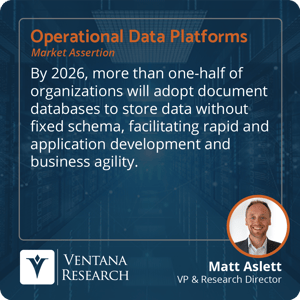The recent publication of our Value Index research highlights the impact of intelligent applications on the operational data platforms sector. While we continue to believe that, for most use cases, there is a clear, functional requirement for either analytic or operational data platforms, recent growth in the development of intelligent applications infused with the results of analytic processes, such as personalization and artificial intelligence (AI)-driven recommendations, has increasing influence over requirements for operational data platforms to support real-time analytic functionality. Operational data platform vendors, including MongoDB, are responding to these evolving requirements with new functionality to support the development and deployment of intelligent applications.
MongoDB was founded in 2007 and has established itself as one of the most prominent NoSQL database providers with its document-oriented database and associated cloud services, as well as a focus on the needs of development teams to deliver innovation through the development of data-driven applications. As I previously noted, while MongoDB continues to make its software available for self-managed deployment on premises or in the cloud, the company’s success is increasingly built on its MongoDB Atlas managed service. MongoDB Atlas is available on Amazon Web Services, Google Cloud Platform and Microsoft Azure. MongoDB Atlas accounted for almost two-thirds (65%) of the company’s $361.3 million fourth-quarter revenue, which contributed to fiscal 2023 revenue up 47% to $1.2 billion. MongoDB’s success can be attributed to multiple factors. One of these is that the company’s database is based on the document model, which does not require strict database schema to be enforced when data is written to disk. The MongoDB database enables the data model to evolve as application requirements change, supporting agile development and business flexibility.
I assert that by 2026, more than one-half of organizations will adopt document databases to store data without fixed schema, facilitating rapid application development and business agility. While the primary influencers of database adoption have traditionally been database administrators, MongoDB has also benefitted from its focus on the needs of developers. The company has facilitated adoption with a combination of cloud services, flexible licensing and functionality designed to support developer efficiency. MongoDB’s Atlas is positioned as a developer data platform, comprising not just the database itself but associated application services that accelerate the development, deployment and management of data-driven applications across hybrid and multi-cloud infrastructure. Compatibility with agile development approaches has also benefited the company as its database is adopted by organizations to facilitate business and digital transformation initiatives.
agility. While the primary influencers of database adoption have traditionally been database administrators, MongoDB has also benefitted from its focus on the needs of developers. The company has facilitated adoption with a combination of cloud services, flexible licensing and functionality designed to support developer efficiency. MongoDB’s Atlas is positioned as a developer data platform, comprising not just the database itself but associated application services that accelerate the development, deployment and management of data-driven applications across hybrid and multi-cloud infrastructure. Compatibility with agile development approaches has also benefited the company as its database is adopted by organizations to facilitate business and digital transformation initiatives.
At the heart of the Atlas managed service is MongoDB’s document database. It is only one aspect of the developer data platform, however, combined with APIs, triggers and functions to support the development and integration of applications, full-text search capabilities based on the open-source Apache Lucene search engine library, and synchronization with mobile applications that utilize MongoDB’s Realm mobile database. The MongoDB database is predominantly used to support operational applications, rather than analytic workloads. In recent years, the company has invested in functionality to make the product better suited to enabling the analysis of operational data, supporting what it refers to as “application-driven analytics.” MongoDB Atlas Data Federation enables users to query, transform and aggregate data from multiple MongoDB Atlas databases, as well as Amazon Web Services’ S3 cloud storage service. Atlas Data Federation was previously known as Atlas Data Lake but was rebranded in 2022 when MongoDB began using the Atlas Data Lake name for its managed storage offering for analytics. Atlas Data Lake enables users to automatically extract snapshots of data from Atlas into a managed object storage. Our research highlights that this is an increasingly popular proposition. More than one-half of participants (53%) in Ventana Research’s Analytics and Data Benchmark Research are already using object stores in their analytics efforts, while a further 18% are planning to do so. Atlas Data Lake’s object storage layer is optimized for analytic queries via partition level indexes to reduce data scans and improve query performance.
Analytics workloads are also enabled by MongoDB Atlas Charts, the company’s tool for creating, sharing and embedding visualizations based on data in Atlas (as well as other data.png?width=300&height=300&name=Ventana_Research_Analytics_and_Data_Use_of_Object_Stores_in_Analytics_Efforts%20(2).png) sources via Atlas Data Federation). In mid-2022, the company announced the MongoDB Atlas SQL Interface for integration with analytics and visualization tools from other vendors. The Atlas SQL Interface uses mongosql, an SQL dialect designed specifically for the document model that is compatible with SQL-92. It also utilizes Atlas Data Federation to enable querying of data in Atlas as well as cloud storage. MongoDB is also developing a series of connectors and drivers compatible with the Atlas SQL Interface. A Java Database Connectivity (JDBC) driver is already available, with an Open Database Connectivity (ODBC) driver coming soon. A connector for Tableau is available in preview and a connector for Microsoft’s Power BI is in development. Other announcements made at the company’s MongoDB World Customer Conference in June 2022 included the general availability of the preview release of Atlas Serverless, a serverless database offering that scales automatically based on evolving performance and capacity requirements, and the preview release of queryable encryption, providing the capability to query sensitive data without the need to decrypt it.
sources via Atlas Data Federation). In mid-2022, the company announced the MongoDB Atlas SQL Interface for integration with analytics and visualization tools from other vendors. The Atlas SQL Interface uses mongosql, an SQL dialect designed specifically for the document model that is compatible with SQL-92. It also utilizes Atlas Data Federation to enable querying of data in Atlas as well as cloud storage. MongoDB is also developing a series of connectors and drivers compatible with the Atlas SQL Interface. A Java Database Connectivity (JDBC) driver is already available, with an Open Database Connectivity (ODBC) driver coming soon. A connector for Tableau is available in preview and a connector for Microsoft’s Power BI is in development. Other announcements made at the company’s MongoDB World Customer Conference in June 2022 included the general availability of the preview release of Atlas Serverless, a serverless database offering that scales automatically based on evolving performance and capacity requirements, and the preview release of queryable encryption, providing the capability to query sensitive data without the need to decrypt it.
MongoDB’s Atlas Data Lake provides customers with the ability to run analytics workloads, but the company is not necessarily looking to compete with data warehouse and data lakehouse providers. It recently expanded its integration with Databricks, for example. Nevertheless, there is scope for confusion, and we believe there is a case for the company entering into similar partnerships with other data lakehouse providers to better articulate its positioning and how functionality to support intelligent operational applications can complement separate platforms for business intelligence (BI), data science and machine learning (ML). In the interim, Atlas Data Lake and other capabilities support the company’s ability to address the development of application-driven analytics. I recommend that organizations evaluating potential database providers for new, intelligent operational applications include MongoDB Atlas in their evaluations.
Regards,
Matt Aslett



